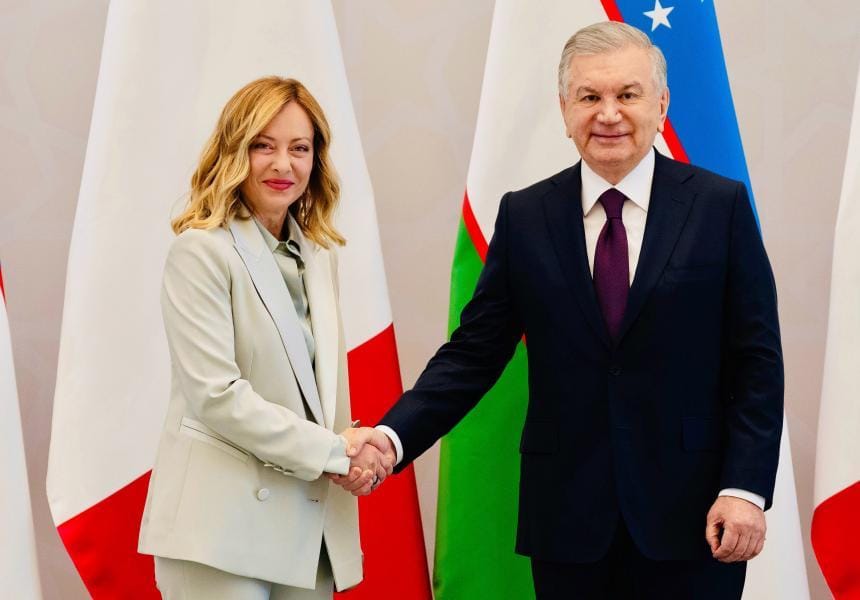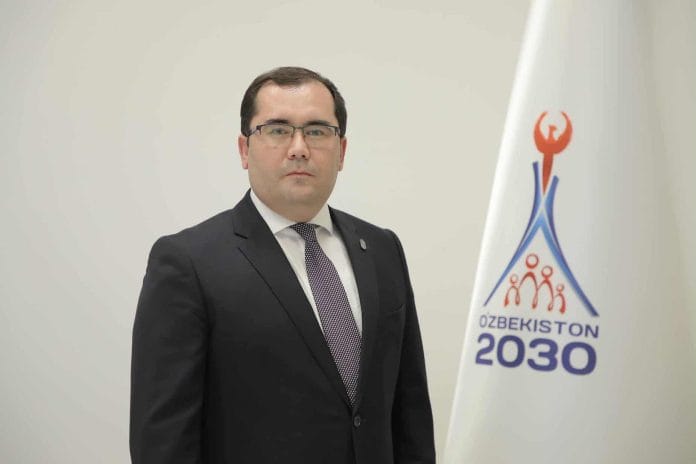After the historic visit to Brussels of the President of Uzbekistan, Shavkat Mirziyoyev, NE Global discussed with Eldor Tulyakov, Executive Director at the Development Strategies Center (DSC), Uzbekistan, the outcomes of this important bilateral meeting in Brussels. The agreement signed will have an impact on the bilateral trade level but also at Central Asian regional level.
NE Global (NEG): What do you expect in the future after this agreement about bilateral relations?
Eldor Tulyakov (ET): Indeed, the signing of the Enhanced Partnership and Cooperation Agreement (EPCA) between Uzbekistan and the European Union in Brussels on October 24 represents a pivotal moment in the development of strategic relations between the two parties. The EPCA, which concludes negotiations launched in 2019 and initialed in 2022, represents a strategic upgrade in the partnership both in scope and ambition. Encompassing nine titles, 356 articles, and 14 annexes, it establishes a comprehensive framework to deepen political dialogue, strengthen rule-of-law institutions, and align economic cooperation with global trends in sustainable development.
Economically, the Agreement is expected to foster deeper integration by aligning Uzbekistan’s regulatory framework with EU standards in technical regulations, product safety, and sanitary and phytosanitary measures. This harmonization will reduce non-tariff barriers, streamline customs and border procedures, and enhance the competitiveness of Uzbek exporters in European and global markets.
In a broader sense, the EPCA opens pathways for joint ventures, industrial clusters, and extended value chains in manufacturing and agro-processing. It will help advance energy efficiency, green technologies, and industrial modernization which ultimately will generate higher-quality jobs and stimulate sustainable economic growth at home.
Equally important, the EPCA expands cooperation in education, science, and innovation. It encourages the development of joint university programs, academic exchanges, and research grants, which will accelerate knowledge transfer and strengthen human capital to meet the needs of a digital and green economy.
Finally, the Agreement creates a structured framework for collaboration in critical raw materials essential to global energy and digital transitions. This will allow Uzbekistan to attract responsible investment, improve domestic standards, and integrate into higher segments of global value chains while upholding strong environmental and social safeguards.
In essence, the EPCA transforms Uzbekistan – EU relations from a partnership of dialogue into one of shared modernization and sustainable growth.
NEG: What do you expect from the EU in terms of bilateral trade?
ET: The EU remains one of Uzbekistan’s most significant trading partners, currently ranking third after China and Russia in total trade, exports, and imports. In 2024, the EU accounted for 9.7 percent of Uzbekistan’s overall trade turnover, including 6.3 percent of exports and 12 percent of imports. Between 2017 and 2024, trade with the EU increased 2.4 times, from $2.6 billion to $6.4 billion, with exports growing 3.6 times and imports 2.2 times.
Germany, France, Lithuania, Italy, Czechia, Poland, Latvia, the Netherlands, Belgium, Austria, and Slovenia remain Uzbekistan’s principal EU partners, reflecting the growing diversification of geography of our trade partners.
In 2024, Uzbek exports to the EU reached $1.7 billion, dominated by chemical products (54 percent), including uranium ($775 million), fertilizers ($95.6 million), and other compounds. The EU absorbed 86 percent of Uzbekistan’s uranium exports, 27 percent of fertilizers, and 5 percent of textile exports.
The EU also plays a vital role in supplying Uzbekistan with machinery, equipment, and transport vehicles. These sectors are fundamental to industrial modernization of the country. In 2024, around 50 percent of EU imports ($2.3 billion) consisted of such products, including ten aircraft procured from Germany, France, Czechia, and Slovakia. Another $1.2 billion (24.9 percent) of imports comprised pharmaceuticals, perfumes, cosmetics, and chemicals, making the EU a key partner in both industrial and consumer markets.
Investment flows have followed this upward trajectory. In 2024, foreign direct investment and loans from EU countries rose 77 percent, reaching $4.1 billion, compared to $2.3 billion in 2023 – an eighteen-fold increase since 2017. Germany, the Netherlands were the largest investors, contributing to a cumulative total of $12.4 billion in EU-linked FDI and loans between 2017 and 2024. Over 1,000 enterprises with European participation now operate in Uzbekistan.
A particularly dynamic aspect of trade cooperation with EU is the GSP+ preferential regime, which Uzbekistan has enjoyed since April 2021. Currently, about 60 percent of exports from Uzbekistan to the EU benefit from preferential or duty-free access, with chemical products, fertilizers, cotton, and plastics as the main beneficiaries.
These tangible results demonstrate the EU’s contribution to the growth of Uzbekistan’s private sector and the country’s integration into global markets. Going forward, we expect the EPCA to further expand this trajectory by reinforcing fair market access, promoting green and digital trade, and ensuring that our bilateral economic partnership continues to serve as a driver of sustainable and inclusive development.
NEG: What is the impact, at the Central Asian regional level, of this agreement with the EU?
ET: The Enhanced Partnership and Cooperation Agreement (EPCA) between Uzbekistan and the EU will have broader regional implications extending well beyond the bilateral framework.
The EU is already one of the largest trading and investment partners for the five Central Asian states, collectively ranking second only to China. In 2024, trade turnover between Central Asia and the EU reached approximately $60 billion, compared with $94 billion in trade with China and $47 billion with Russia.
For the countries of Central Asia, which are building balanced and sustainable development models grounded in national interests and regional identity, cooperation with the EU provides an important external anchor.
The EU represents not only a vast export market and a source of advanced technology and environmental standards, but also a long-term strategic investor in such priority sectors as mineral resources, industrial processing, digitalization, and the green economy.
Between 2020 and 2024, trade between the EU and Central Asia more than doubled from around $25 billion to $60 billion. This growth was driven largely by EU imports of mineral fuels, lubricants, and related materials.
Meanwhile, EU exports to Central Asia consist primarily of manufactured goods such as machinery, transport equipment, chemical products and pharmaceuticals which contribute to industrial diversification and modernization.
Within the region, Uzbekistan has become the EU’s second-largest trading partner, with bilateral trade reaching $6.4 billion in 2024. The EU’s investment footprint is also deepening across Central Asia, particularly in Uzbekistan, where EU member states and institutions are among the largest sources of foreign direct investment (FDI). The value of EU-linked projects in Uzbekistan alone is estimated at around €30 billion, with the most active investors being Germany, the Netherlands, and others.
The EU’s strategic interest in the region is shaped by several key factors:
Geography – Central Asia’s pivotal position linking Europe and Asia makes it a critical hub for trade and logistics.
Resources – the region is endowed with vast reserves of oil, gas, uranium, and rare earth metals.
Economic potential – dynamic growth and efforts toward diversification attract responsible European investment.
Human capital – around 80 million people, mostly young and innovation-oriented, form a growing base for digital and green transformation.
Connectivity is central to this partnership. Through the EU’s Global Gateway strategy and the Trans-Caspian International Transport Route (TITR) or Middle Corridor, the EU is investing in infrastructure that links China and Europe through Central Asia, supporting logistics modernization, digital corridors, and greener transport. Better connectivity means lower trade costs, faster delivery times, and more diversified export routes – tangible levers for competitiveness and resilience.
Crucially, the EPCA complements these efforts by institutionalizing cooperation on critical raw materials, underpinned by the EU–Uzbekistan Memorandum of Understanding signed in 2024. This cooperation opens access to responsible investment, higher value chains, and enhanced environmental governance.
At the regional level, the EPCA also aligns with the outcomes of recent EU–Central Asia summits, particularly the Samarkand Summit of April 2025, which paved the way for the upcoming Third EU-Central Asia Economic Forum and Trans-Caspian Connectivity Investors Forum in Tashkent in November 2025.
The joint statement accompanying the EPCA underscores shared commitments to the UN Charter and the principles of independence, sovereignty, and territorial integrity, reaffirming the EU’s constructive engagement with Central Asia as a region of stability and opportunity.
In addition, EU financial institutions are playing a major role. The European Bank for Reconstruction and Development (EBRD) has invested over €5 billion in Uzbekistan’s economy, making the country one of its largest beneficiaries. The European Investment Bank (EIB) will open its regional office in Tashkent by the end of 2025, focusing on sustainable transport, energy, and water management further demonstrating the EU’s long-term strategic vision for the region’s connectivity and green transition.
Overall, the EPCA reflects the convergence of Uzbekistan’s reform agenda and the EU’s strategic engagement under the Global Gateway initiative. It is both a national milestone and a regional accelerator, embedding Central Asia more firmly into the global economic and institutional architecture.
NEG: How important would you define the role played by Germany, France, and Italy in reaching this agreement?
ET: Definitely, Germany, France, and Italy have played and will continue to play a pivotal role in achieving the objectives of the Enhanced Partnership and Cooperation Agreement and ensuring its effective implementation.
Over the past few years, Uzbekistan has developed particularly close and productive relations with these three leading EU member states, marked by high-level political dialogue, growing trade, and significant investment partnerships.
By the end of 2024, Germany ($1.2 billion), France ($1.1 billion), and Italy ($438 million) ranked among Uzbekistan’s top trading partners within the EU.
Their combined engagement underscores the strategic depth of the republic’s partnership with Europe and provides a strong foundation for expanding cooperation across multiple sectors.
President Shavkat Mirziyoyev’s high-level visits to Berlin, Paris, and Rome and reciprocal visits by European leaders have solidified this dynamic:
France: On November 1–2, 2023, President Emmanuel Macron made a historic state visit to Uzbekistan — the first in three decades — elevating bilateral relations to the level of a strategic partnership. The visit produced agreements in energy, culture, education, and green transition sectors.
Germany: Federal Chancellor Olaf Scholz paid his first official visit to Central Asia on September 15–16, 2024, holding substantive talks with President Mirziyoyev on economic, educational, and environmental cooperation. The two leaders also oversaw the Uzbek–German Economic Forum in Samarkand, resulting in major business agreements and partnerships.
Italy: On May 28–29, 2025, Prime Minister Giorgia Meloni visited Tashkent, reaffirming the two countries’ shared interest in deepening their strategic partnership, particularly in energy, textiles, and transport infrastructure.

These engagements demonstrate that Germany, France, and Italy are not only leading EU economies but also Uzbekistan’s principal strategic partners in implementing the EPCA’s goals, from sustainable development and industrial modernization to connectivity and human capital growth.
Their active involvement will ensure that the new phase of Uzbekistan–EU strategic relations remain pragmatic, future-oriented, and mutually beneficial.








